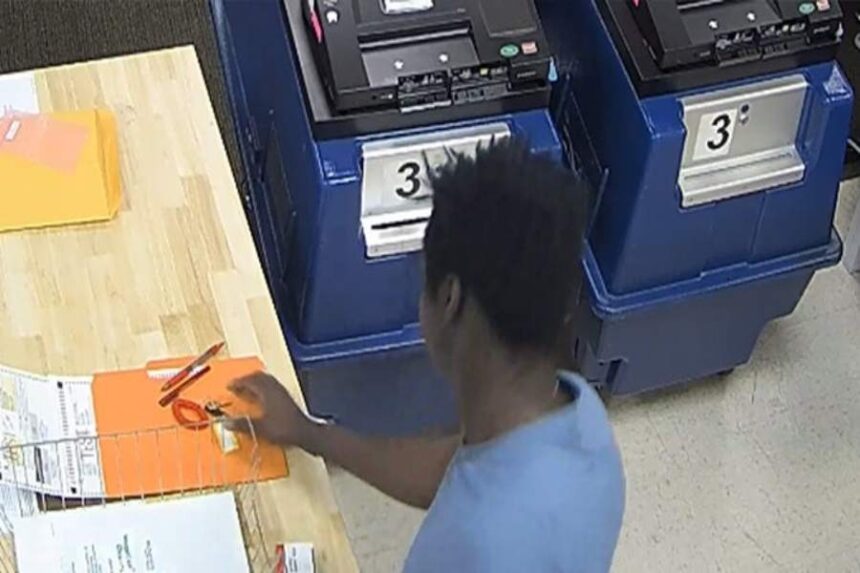In an unsettling breach of election security protocols, Walter Ringfield, a 27-year-old temporary election worker, was apprehended after allegedly appropriating a security fob and keys from the Maricopa County Tabulation and Election Center in Arizona.
This incident highlighted potential vulnerabilities within the election system and underscored the efficacy of the safeguards already in place. T
his comprehensive analysis delves deeply into the nuances of the event, examining how it unfolded, the immediate response by election officials, and the broader implications for maintaining the integrity of election security nationwide.
Ringfield’s arrest served as a critical test of the robustness of the election center’s security measures. It shed light on the importance of continuous vigilance and the need for constant updates to security protocols to address emerging threats.
This event catalyzed a more comprehensive discussion among policymakers, security experts, and the public on how best to fortify election systems against internal and external risks.
This analysis explores these discussions and the strategies being considered to enhance the resilience of election systems across the United States, ensuring that democracy is defended against any form of compromise.
Incident Overview
The theft occurred late Thursday afternoon when Walter Ringfield, a temporary election worker, was captured on the comprehensive network of security cameras within the Maricopa County Tabulation and Election Center.
He was observed discreetly taking a red wrist lanyard, which was not just a simple accessory but a critical security device equipped with a fob and keys.
These tools are vital for accessing and operating ballot tabulation machines, which are central to the integrity and functionality of the voting process.
The timing of Ringfield’s actions was particularly concerning. They occurred just as the county was ramping up preparations for the primary elections and amid the sensitive phase of mail ballot distributions.
This timing raised the stakes, as any compromise in the security of the tabulation machines could have far-reaching consequences for the fairness and accuracy of the election.
In response, both election officials and law enforcement were quick to mobilize, demonstrating the efficacy of the emergency protocols. The immediate and rigorous reaction included a thorough review of surveillance footage, rapid on-site security assessments, and coordination between multiple layers of election administration and law enforcement agencies.
This incident tested the resilience of the election center’s security measures. It highlighted the critical nature of constant vigilance during election cycles, especially in phases involving the handling and processing of voting equipment and materials.
Arrest and Legal Proceedings
The subsequent morning, election workers noticed the missing items during a routine inventory check. Shortly after, surveillance footage was reviewed and identified Ringfield as the suspect, and the Maricopa County Sheriff’s Office was promptly notified.
Following his arrest outside his home in Phoenix, Ringfield faced charges of theft and criminal damage. This prompt legal action underscores the severity of the potential risk to the integrity of the elections.
County officials responded comprehensively to mitigate any potential impact upon discovering the theft. The compromised security fob necessitated immediately reprogramming all associated devices and retesting ballot tabulation machines.
This process, costing approximately $19,000, involved significant logistical and financial resources but was crucial in maintaining the security integrity of the upcoming elections.
The robust security protocols, including regular inventory checks and extensive surveillance systems, proved crucial in quickly identifying and addressing the breach.
These measures reflect Maricopa County’s ongoing commitment to safeguarding its election processes against potential threats.
Ringfield’s motivations for the theft remain ambiguous. During the investigation, he claimed he had taken the fob to “clean up” and secure a permanent position at the election center. This statement has puzzled law enforcement and election officials alike.
This incident highlights the complexities of securing temporary workers who may need to comprehend the full implications of their actions on election integrity.
The theft has had significant political and public ramifications. It has stoked concerns about election security, particularly in Maricopa County, which has been at the epicenter of election fraud allegations, especially following the 2020 presidential election.
Arizona Secretary of State Adrian Fontes reassured the public about the state’s election security measures, emphasizing that the systems are designed to detect such anomalies and that the prompt actions of election staff prevented any significant impact on upcoming elections.
This incident has also reignited debates about the adequacy of current election security measures and the need for ongoing reforms to address internal and external threats.
Implications for Future Election Security
This incident serves as a critical reminder of the vulnerabilities present within electoral systems and the continuous need for vigilance and improvement in election security protocols. For future elections, several recommendations can be made:
Strengthen background checks and provide comprehensive training for all election workers to emphasize the critical nature of their roles and the severe implications of any breaches.
More sophisticated security technologies, including biometric access controls and advanced surveillance systems, are being incorporated to monitor sensitive areas within election facilities.
It improves communication with the public about the security measures and the steps taken to respond to incidents, bolstering public confidence in the electoral process.
Conduct audits of election security protocols to identify and address potential vulnerabilities before they can be exploited.
The arrest of Walter Ringfield for theft at the Maricopa County Tabulation and Election Center underlines the persistent and multifaceted challenges of safeguarding election integrity.
While alarming, this incident ultimately served as a testament to the robustness of the security frameworks in place.
The swift and decisive actions taken by election officials mitigated a significant threat and demonstrated the operational readiness and effectiveness of existing security measures.
The insights gained from this incident are invaluable as the United States continues to confront various threats to its electoral processes, both from internal vulnerabilities and external pressures. They provide a critical learning opportunity for election authorities nationwide.
The proactive measures, including rapid incident response and comprehensive system audits, exemplify practices that can be adopted more broadly to enhance security protocols.
Furthermore, this event underscores the importance of continuous improvement and adaptation in election security strategies to address evolving threats.
Ensuring the resilience and integrity of democratic processes requires an ongoing commitment to refining and strengthening security measures, reinforcing public trust in the electoral system.




